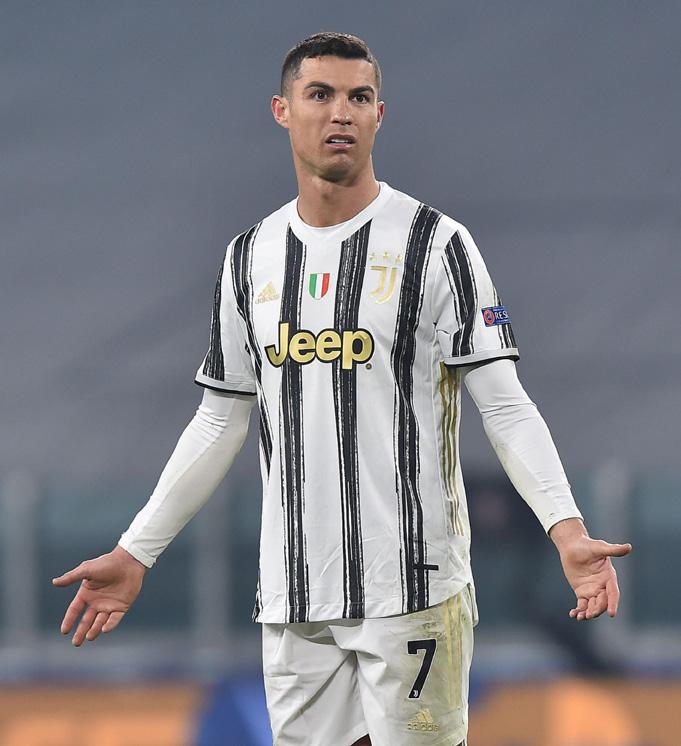
3 minute read
MOURINHO
either side of a severely disrupted campaign. However, this season’s failure to beat Porto over two matches has been considered near inexcusable for many. Failure in both Serie A and the Champions League has seen questions raised on Pirlo’s appointment, with Juventus likely to change manager for the third consecutive summer. However, unlike in previous seasons, attention has turned to the squad itself, and more specifically to their record signing as fans and management alike seek explanations. On the surface there appears to be a direct link between Ronaldo’s arrival and Juventus’ steep decline. Particularly underwhelming performances in both legs against Porto further increased the argument that the man that Agnelli brought in to win the Champions League has had the complete opposite effect; having reached the finals twice in three years without Ronaldo, they have won just one knock-out match with him. However, as the phrase goes, correlation does not imply causation, and placing Juventus’ European failures entirely at the feet of Ronaldo would not only be unfair but inaccurate. The forward has been arguably the club’s best player week in, week out over the past three years although has come up against limited opposition. Whereas the No 7 has scored more than any other player in Serie A since making his debut with 76 goals, no other Juventus player has notched more than 18 in the same period. Indeed, unlike at Real Madrid where Ronaldo benefitted from the likes of Karim Benzema and Gareth Bale to ease the goalscoring burden, neither Federico Chiesa nor Alvaro Morata are likely to hit double digits this season. Likewise, Gonzalo Higuain and Paolo Dybala, who notched 38 goals between them before Ronaldo’s arrival, managed precisely half that last season. This appears to be the root of the problem at Juventus. There is no doubt that at 36, Ronaldo is not the player he was at his peak, however, where Real Madrid had the quality to manage his decline, Juventus simply do not. The team Zidane built around the Portugual captain had not only the ability to shine elsewhere, but also the defensive structure and resilience to grind out wins if necessary. It is not only up front that the Bianconeri are lacking. The defence that won Juventus their titles under Conte is a thing of the past with Andrea Barzagli retiring, Giorgio Chiellini nearing the end of his career and Leonardo Bonucci not looking the same since his single season with Milan. Whilst young guns Matthijs de Ligt and Merih Demiral are set for the future, they still look shaky, and the Juan Cuadrado/Alex Sandro full-back pairing is nowhere near the level of Europe’s best. Clearly Juventus’ issues are at a systemic level, with poor squad building in recent years reflected by inconsistent managerial recruitment. The majority of Juventus fans now acknowledge that allowing Allegri to leave was a mistake but replacing him with a man famous for a possession-centric tactic in a team starring Cristiano Ronaldo appeared a strange decision even at the time. Giving up on the Sarri-ball experiment after just one year would have made sense had another plan been in the works, with the team undergoing a transitional period. Instead, the club hired a man with no senior managerial experience who had only that summer completed his coaching qualifications. Over the period of three years Juventus have gone from being the best-run club in Italy, if not Europe, to fighting for Champions League qualification. Rather than the Cristiano Ronaldo project failing, it appears that the Juventus project has failed Ronaldo.
ABOVE: The goals have flowed for Ronaldo since making the move…
Advertisement
BOTTOM: …and – until 2021 at least – domestic trophies were plentiful
TOP RIGHT: But European success is as far away for Juve as it was before spending big on CR7
BOTTOM RIGHT: Juventus celebrating winning the Champions League in 1996

JUVENTUS’ CHAMPIONS LEAGUE HISTORY

YEAR RESULT 1992-93 Did not qualify 1993-94 Did not qualify 1994-95 Did not qualify 1995-96 WINNER 1996-97 Runner-up 1997-98 Runner-up 1998-99 Semi-final 1999-00 Did not qualify 2000-01 Group stage 2001-02 Group stage 2002-03 Runner-up 2003-04 Round of 16 2004-05 Quarter-final 2005-06 Quarter-final 2006-07 Did not qualify 2007-08 Did not qualify 2008-09 Round of 16 2009-10 Group stage 2010-11 Did not qualify 2011-12 Did not qualify 2012-13 Quarter-final 2013-14 Group stage 2014-15 Runner-up 2015-16 Round of 16 2016-17 Runner-up 2017-18 Quarter-final 2018-19 Quarter-final 2019-20 Round of 16 2020-21 Round of 16











